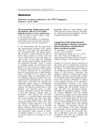 27 citations,
September 2018 in “Nanomedicine: Nanotechnology, Biology and Medicine”
27 citations,
September 2018 in “Nanomedicine: Nanotechnology, Biology and Medicine” Further research is needed to improve hair regeneration using stem cells and nanomaterials.
 127 citations,
January 2013 in “PLOS ONE”
127 citations,
January 2013 in “PLOS ONE” Probiotic bacteria improved skin and hair health in aged mice.
 1 citations,
December 2022 in “Current Issues in Molecular Biology”
1 citations,
December 2022 in “Current Issues in Molecular Biology” Annurca apple extract improved hair growth in mice and could potentially prevent hair loss.
 12 citations,
April 2014 in “Molecular Medicine Reports”
12 citations,
April 2014 in “Molecular Medicine Reports” Targeting specific miRNAs may help treat hair follicle issues caused by hydrogen peroxide.
 5 citations,
January 2022 in “Molecular Medicine Reports”
5 citations,
January 2022 in “Molecular Medicine Reports” Pine bark extract helps mice grow hair by reducing inflammation and boosting growth factors.
 4 citations,
January 2012 in “Chemical Immunology”
4 citations,
January 2012 in “Chemical Immunology” Some drugs, especially biologics, can cause skin reactions that look like other skin diseases, and stopping the drug usually helps clear up these reactions.
 14 citations,
October 2020 in “Scientific reports”
14 citations,
October 2020 in “Scientific reports” Hair greying is linked to reduced ATM protein in hair cells, which protects against stress and damage.

research Skin
2 citations,
January 2011 in “Elsevier eBooks” Skin problems are common in Lupus patients and can indicate the disease's severity, requiring specific treatments and lifestyle changes.
 157 citations,
August 2010 in “Lupus”
157 citations,
August 2010 in “Lupus” The document concludes that recognizing and treating cutaneous lupus erythematosus early is crucial for managing the skin and potential systemic symptoms.
 1533 citations,
October 2008 in “Endocrine reviews”
1533 citations,
October 2008 in “Endocrine reviews” Mice without the vitamin D receptor have bone issues and other health problems, suggesting vitamin D is important for preventing various diseases in humans.
 64 citations,
January 2015 in “BioMed Research International”
64 citations,
January 2015 in “BioMed Research International” Certain growth factors can promote hair growth in mice by activating hair growth-related proteins.
99 citations,
September 2007 in “The American journal of pathology” Chemotherapy damages hair follicles, causing hair loss and other cellular changes.
 49 citations,
October 2014 in “International Scholarly Research Notices”
49 citations,
October 2014 in “International Scholarly Research Notices” Eclipta alba has many health benefits and contains compounds with potential for drug development.

Sunekos® effectively improves labia majora appearance and is well-tolerated.
 July 2021 in “IntechOpen eBooks”
July 2021 in “IntechOpen eBooks” Ginseng, especially its component ginsenosides, can promote hair growth, reduce hair loss, and potentially treat conditions like alopecia by affecting cell pathways and cytokines.
 38 citations,
April 2016 in “Experimental Dermatology”
38 citations,
April 2016 in “Experimental Dermatology” The document concludes that understanding hair follicle cell cycles is crucial for hair growth and alopecia research, and recommends specific techniques and future research directions.
6 citations,
November 2022 in “Antioxidants” OR2AT4 helps reduce aging and cell damage in human skin cells.
 71 citations,
May 2007 in “The FASEB journal”
71 citations,
May 2007 in “The FASEB journal” Human hair follicles produce and respond to erythropoietin, helping protect against stress.
 275 citations,
March 1999 in “Journal of The American Academy of Dermatology”
275 citations,
March 1999 in “Journal of The American Academy of Dermatology” Chemotherapy can cause various skin reactions, with hair loss being the most common, and proper diagnosis and treatment of these reactions are important.
3 citations,
October 2023 in “Cosmetics” Healthy lifestyle changes can significantly improve skin health as you age.
17 citations,
July 2013 in “Amino Acids” Increased ODC activity leads to skin tumors by recruiting stem cells, not by toxic byproducts.
 2 citations,
September 2004 in “International Journal of Cosmetic Science”
2 citations,
September 2004 in “International Journal of Cosmetic Science” Hair quality is genetically determined and linked to its composition and strength.
October 2023 in “Applied sciences” Iris germanica rhizome-derived exosomes help protect skin cells from oxidative stress and aging.
 155 citations,
August 1991 in “Journal of The American Academy of Dermatology”
155 citations,
August 1991 in “Journal of The American Academy of Dermatology” Methotrexate treats various disorders by inhibiting DNA synthesis, but careful monitoring is needed to avoid toxicity and manage side effects.
 1 citations,
January 2023 in “Frontiers in veterinary science”
1 citations,
January 2023 in “Frontiers in veterinary science” Activating autophagy in dogs with certain diseases improves their skin and hair.
92 citations,
December 2005 in “The Journal of clinical investigation/The journal of clinical investigation” Human hair follicle stem cells can be isolated using specific markers for potential therapeutic use.
 December 2024 in “International Journal of Molecular Sciences”
December 2024 in “International Journal of Molecular Sciences” Linoleic acid is important for healthy skin and hair.
 52 citations,
September 2018 in “International Journal of Molecular Sciences”
52 citations,
September 2018 in “International Journal of Molecular Sciences” Ginseng and its compounds may help hair growth and prevent hair loss, but more human trials are needed to confirm this.
 26 citations,
March 2014 in “Journal of cutaneous medicine and surgery”
26 citations,
March 2014 in “Journal of cutaneous medicine and surgery” Topical vitamin D is useful for some skin conditions but not effective for others, and more research is needed.
 229 citations,
August 2002 in “Experimental Gerontology”
229 citations,
August 2002 in “Experimental Gerontology” AGA causes hair loss by shrinking hair follicles due to DHT binding, and can be treated with finasteride and minoxidil.
























